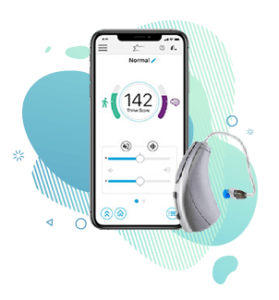Hearing Test & Consultation
Hearing tests are the most effective way to detect the onset of hearing loss and the degree. Having your hearing tested annually helps to ensure that your ears are at their healthiest, and that signs of loss are detected early so that a treatment plan can be recommended.
Hearing tests are typically recommended annually after the age of 65, similarly to regular medical check ups with your doctor, dentist or optometrist. It is important not to wait, because when hearing loss goes undetected, it can result in a lower quality of life.
How is a hearing test done?
A hearing test starts with a diagnostic assessment. An audiologist or hearing instrument specialist will review your ability to hear by asking a series of questions about your exposure to loud noises, daily routine, and other events or activities that may affect your hearing.
Once this is completed, your hearing will be tested in a soundproof booth. You will listen to different sounds played at different frequencies, within a range of 125 to 8,000 Hertz. These sounds are played individually in each ear to detect the level of hearing loss in one or both ears, with the volume gradually increasing. With each sound, you will be asked to indicate confirm which sounds you hear. A similar test may also be conducted using vibrations felt against the skull to detect possible damage to the middle ear.
What will my hearing test results indicate?
The results of your hearing test are evaluated using an audiogram. Your responses are graded according to a scale that indicates hearing levels in decibels to determine deviations from normal hearing. These indicate how well you can hear sounds, and the degree of hearing loss for cues your ears cannot detect.
The audiogram evaluation helps hearing healthcare professionals to diagnose the type and degree of hearing loss, as well as the most suitable hearing aid to correct this according to your lifestyle.
Hearing Test in 5 Steps:
Ear Exam: this visual examination of your ears indicates other factors that could affect your ability to hear and the test results, such as an ear infection or earwax build-up.
Personal Hearing Survey: The hearing healthcare professional will ask you a series of questions about your lifestyle, exposure to loud noises, hearing, and general health factors that can impact hearing, like diabetes or high blood pressure.
Hearing Test: a professional evaluation of your hearing in a soundproof booth or room where you will be asked to respond to sounds at different frequencies.
Results: a hearing healthcare professional will explain the results of your hearing test and show deviations from normal hearing to recommend the right treatment.
Solutions: you will be fitted with the right hearing aid according to the degree of hearing loss and your lifestyle.
Reasons to Schedule a Hearing Test:
- Age: in most adults, the first signs of hearing loss occur after the age of 50. This onset is typically gradual and affects low sound frequencies at first until loved ones notice communication issues arising from being hard of hearing.
- Illness and accidents: some health conditions and accidents can cause hearing loss in children and young adults. Hearing tests may be recommended in recovery to determine any lasting impact of these events.
- Lifestyle and occupational hazards: musicians, industrial workers, and other professionals are constantly exposed to loud noises. Regular hearing tests should be conducted as part of workplace safety.
In addition to the above, you can also ask yourself these self-evaluation questions to determine if you need a hearing test:
- Conversation: do you often need to ask others to speak more loudly, or find their speaking not loud enough or unclear? When listening to others talk, do you feel like they are mumbling or speaking unintelligibly?
- Lifestyle: do other people often ask you why the TV is on so loud, or if you didn’t hear your phone, the doorbell, and other devices ring? Do you hear a ringing sound or other noises in your ears?
- Tasks and other events: do you have trouble keeping up with conversations or instructions over the phone and in large groups, especially with background noise? Do you find yourself sitting up front, close to the speakers in the theatre or during presentations?
Preparing for Your Hearing Test Appointment
- Be prepared to stay for 90 minutes: a complete hearing test and hearing needs assessment takes about 90 minutes, so make sure to have enough room in your schedule.
- Bring a family member or friend: parts of the hearing test may be conducted using a familiar voice since the brain is wired to recognize sounds from already familiar sources. This also allows us to get a better picture of your daily routine and interactions that may be affected by hearing loss.
- Identify and explain your hearing challenges and experiences: It is important to be open and honest with the hearing healthcare professional about what you have been experiencing
- Medical information: providing a list other medical conditions and medications you are currently taking is important as these things may also be affecting your hearing health.
- Lifestyle: tell us about your daily routine to determine occupational hazards like exposure to loud noises.
Put your Trust in Us – Living Sounds Hearing Centre
At Living Sounds Hearing Centre, our professionals recommend regular hearing tests as this helps to ensure early detection of hearing loss and slow the progression.
A hearing test helps to diagnose hearing loss effectively and recommend the right treatment according to the degree of the condition. This helps us fit our clients with the right hearing aid according to your lifestyle, hobbies, and the occupational hazards you are exposed to.
To learn more about hearing tests and assessing your hearing needs so you can be fitted with the right hearing aid, call Living Sounds Hearing Centre at 780-488-8100 or book an appointment online.



